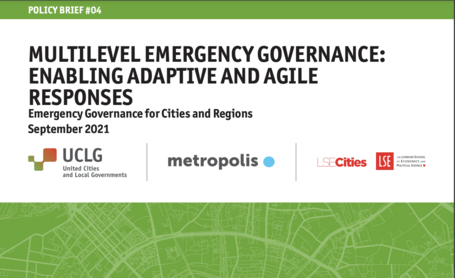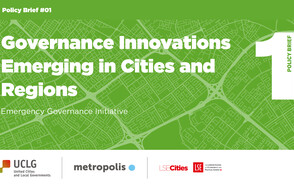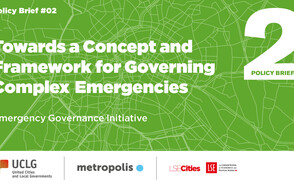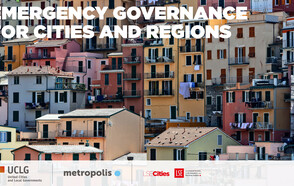
UCLG, Metropolis and LSE Cities just launched the fourth Policy Brief of their joint Emergency Governance Initiative. In this occasion, the focus is placed on multilevel governance and cooperation between different tiers of government during complex emergencies such as COVID-19, climate change and social crises. Putting forward key principles for the governance of increasingly recurrent and complex emergencies, the Policy Brief proposes concrete recommendations based on direct engagement with LRG representatives and international partners.
This Policy Brief focuses on the (re-) distribution of emergency powers across national, regional and local governments. Building on the inputs and experiences of local and regional governments from 35 countries all over the world, it presents a very diverse range of coordination mechanisms assisting (or complicating) the vertical and horizontal cooperation of government units during the emergency response.
As no single level of government has the capacity to address complex emergencies alone, multilevel governance is the only alternative to either excessive recentralisation or territorial fragmentation during crises. Paying attention to and investing in better coordination are crucial to ensure adaptive and agile responses and to enable local and regional governments to effectively play the key role that complex emergencies, such as the COVID-19 pandemic, require of them.
Finally, this Policy Brief advances strong political recommendations for adaptive and agile multilevel governance allowing co-produced, just and inclusive responses in times of emergency:
▪ Emergency governance requires the government to be in the driving seat as convener in chief, acting on the legitimacy built through transparency, accountability and inclusiveness in emergency response.
▪ Multilevel emergency governance can build on, but needs to go beyond, the usual mode of multilevel governance, with a better coordination of resource allocation and decision making.
▪ Emergency governance needs to embrace a systems approach to facilitate cross-sectoral cooperation and enable experimentation to pilot innovative solutions.
▪ Emergency governance requires hybridity, combining both hierarchical and networked governance. Allocated responsibilities across levels of government must be adequately funded.
▪ There is no ‘one size fits all’ approach to suit all local circumstances and contexts. Nonetheless, the governance of complex emergencies should take advantage of international knowledge and solidarity networks













